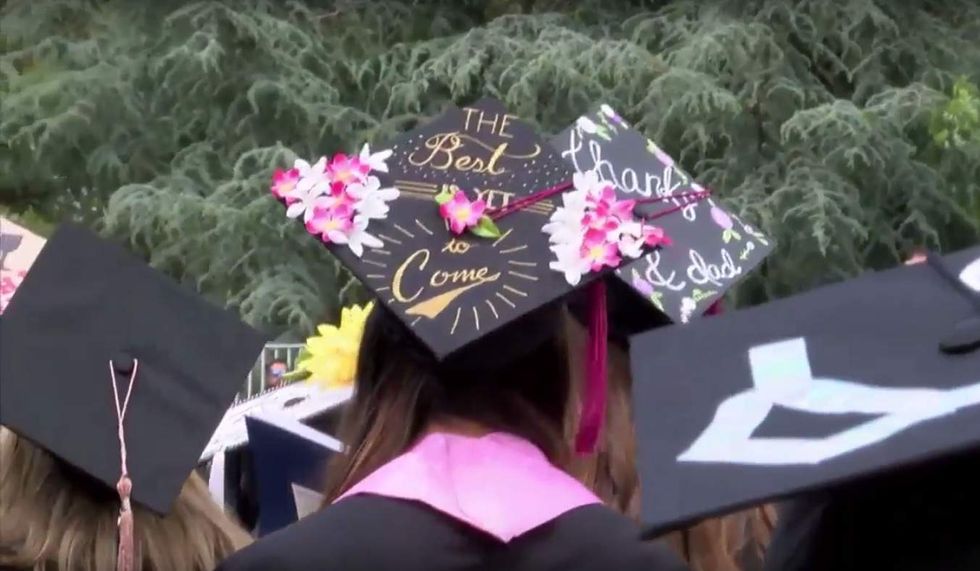
A black female student's poem she recited during the commencement at California's Sonoma State University last month was blasted as "hate speech" by some who heard it. (Image source: YouTube screenshot)

A black female student's poem she recited during a California college commencement last month was blasted as "hate speech" by some who heard it.
Dee Dee Simpson of Sonoma State University in Rohnert Park, California, recited from memory her poem May 20, which called out Republican President Donald Trump, police violence against blacks, and Fox News, the Press Democrat reported.
The poem also contained a number of expletives — and in the end, school President Judy Sakaki emailed an apology, the paper said.
Parent Cara Freedman was waiting for her daughter, Alexa Grossman, to graduate and said she noticed others in the crowd shaking their heads after Simpson “dropped the F-bomb,” the Press Democrat said.
“We were shocked,” Freedman told the paper. “I’m still a little bit shocked. What kind of school is this? Who in the world would allow this to take place?”
Freedman and her ex-husband, Marc Grossman, each sent angry emails to Sakaki, who heard Simpson’s poem up close, the Press Democrat reported.
“How could you allow anyone to give a hate speech like that?” Grossman wrote, the paper said. “You should be ashamed of yourself. There were kids in the audience.”
While Sakaki didn't reply to the Press Democrat's request for comment, the paper said she responded to Grossman's email, regretting that Simpson’s poem was recited and blaming a new graduation format for lack of oversight.
“While a university should include and allow for all kinds of voices and perspectives, and while this individual student is among our accomplished poets, having her offer this particular piece at the Arts and Humanities commencement was a mistake,” Sakaki said, the Press Democrat reported. “It simply should not have happened.”
Simpson — who didn't respond to the paper's request for comment — recited lines about black mothers instructing their children how to behave with police so they “come home at night,” the Press Democrat said.
“My people live in places you wouldn’t drive through in an armored truck,” Simpson told the crowd, the paper reported.
But Kim Baptista — who had been an editor with the campus newspaper and was waiting to receive her diploma — told the Press Democrat she wasn't thrilled that Simpson recited her poem at graduation even though she sympathized with its content.
“People were taken aback,” Baptista told the paper of Simpson's recitation. “Here it was supposed to be a celebratory time. And you’re up there wagging your finger at us.”
Videos of Sonoma State graduations are usually posted on YouTube within a week, the Press Democrat noted. As of Friday, there don't appear to be any clips of the school's 2017 commencement on YouTube. Simpson didn't make available a copy of her poem, the paper reported.
Eric McGuckin, an anthropology professor at Sonoma State, hopped on Facebook after the commencement ceremony and posted a letter to be sent to Sakaki — from "students, alumni, instructors, and staff" at the school — criticizing the president over her apology for Simpson's recitation:
We are alarmed that speech on college campuses is being challenged nationwide, and strongly believe that university officials should encourage open discourse on issues of social and political significance. Such public expression is a key role of universities in a democracy, and we found that the use of a certain profanity and the subject matter, including police violence on communities of color, did not exceed the boundaries of safe expression, nor constitute “hate speech” as accused by one of a few critics.Many of us felt Ms. Simpson’s recitation was perhaps the most impactful address of the ceremony, and we hope that in the future, rather than calling for apologies, such controversies are seen as an opportunity for the administration to support our students, and encourage dialogue and learning.
But one commenter wasn't agreeing.
"While I think a lot of what Dee Dee said was valid," Michael Stompe wrote, "the use of profanity was not necessary and should have been revised especially at an event where there were more children than I will ever have in a classroom ..."
He said that "by refusing an apology we are being very antidemocratic and anti-discussion telling those offended to get over it."
(H/T: The College Fix)